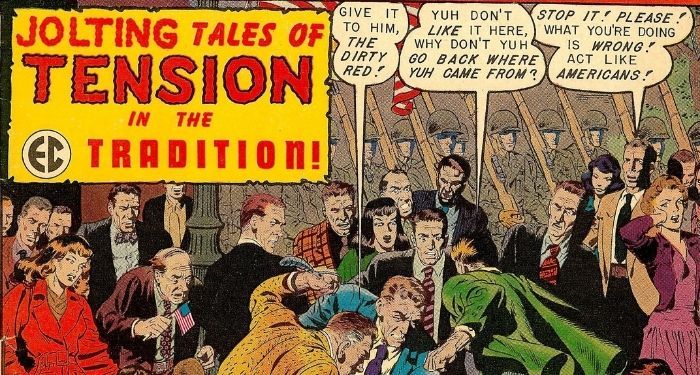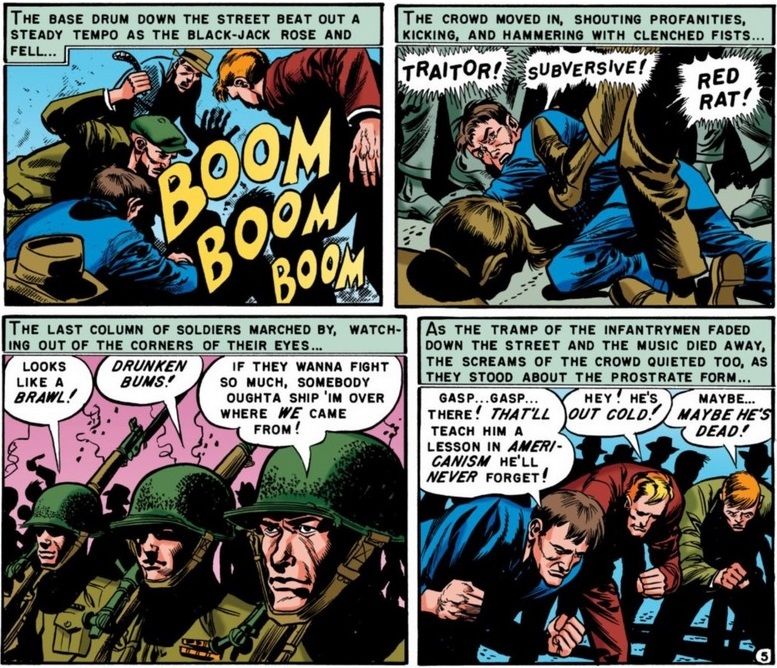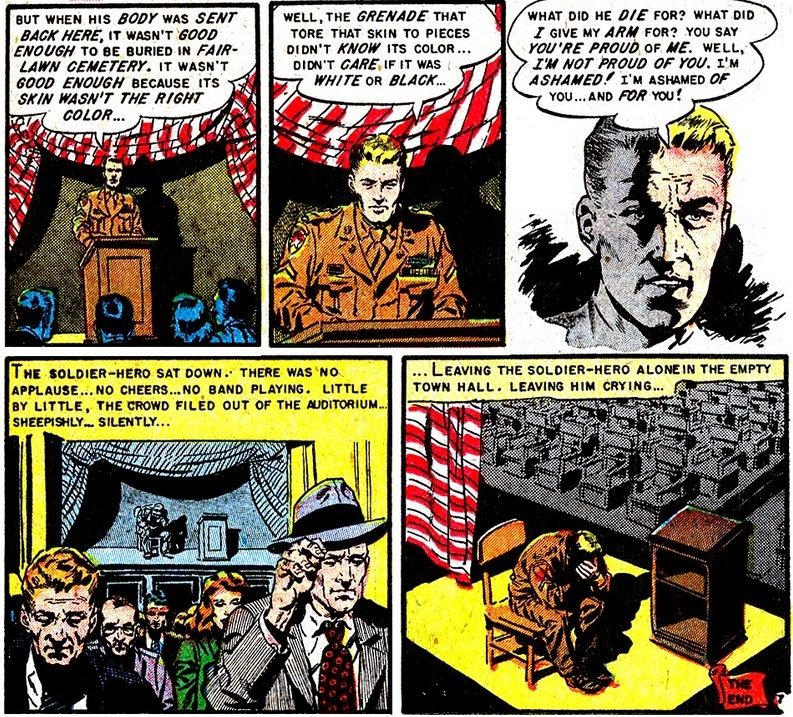
Shock SuspenStories: The Comic That Defied the Red Scare
The Cold War — when the United States and the Soviet Union spent a fun few decades playing nuclear chicken and trying to steal countries from each other — is justifiably remembered as a time of intense paranoia. Many comic books of the period reflect this fact.
But no people and no era is a monolith: just like today, there were plenty of people who disagreed with the dominant ideologies. Some even had the courage, the talent, and the means to publicly challenge prevailing narratives that justified and even encouraged thoughtless fearmongering.
Shock SuspenStories was published by EC Comics from 1952 to 1955. Many issues contain horror tales about, say, dissatisfied spouses murdering their partners in grisly yet ironic ways. But a good number of stories confronted social issues that virtually no other comic at the time was willing to deal with. One of these is “The Patriots!” from Shock SuspenStories #2.
Our story takes place during a parade honoring Korean War soldiers. One of the spectators notices a man who appears to be sneering at the soldiers. Word quickly spreads among the spectators who, filled with righteous fury, assume the man is a lousy commie. When an American flag is carried past and the sneering man fails to take off his hat, the crowd beats him to death. Great security at this parade.

Now here’s the twist: the man wasn’t sneering at all. He was in fact a Korean War vet who got his face blown off, requiring surgery that left him disfigured. Oh, and he’s blind, so he didn’t see the flag going by. OOPS.
Characters in this series tend to overreact anyway, hence the high murder rate. But in this case, it serves a purpose. Shock SuspenStories was published at the height of the Red Scare, when careers and lives were routinely destroyed by unfounded rumors, uncontrolled fear, and blatant prejudice perpetrated by individuals and groups claiming to be patriots. One example of this comes from 1952, when Hollywood had come under blistering fire from the federal government. Many creatives were dragged before Congress as suspected communists. They were then blacklisted and even jailed for refusing to cooperate with what they saw as an infringement on their right to free speech. Others, like future president Ronald Reagan, turned snitch and added to the hysteria. “The Patriots!” is an obvious rebuke of such mob mentality.
It wasn’t the only time this comic dealt with the Cold War. “In Gratitude…” (see what they did there?) from Shock SuspenStories #11 tackled another ’50s problem that Americans didn’t like to acknowledge: racism. A Korean war hero sends the corpse of his friend — who sacrificed himself to save the hero’s life — to his hometown for an honorable burial. When the hero gets home, he is horrified to discover that the townspeople refused to allow his friend, who is Black, to be buried in their cemetery. The story ends with the hero using his own welcome home rally to chew out the townspeople and then breaking down in tears.

This may seem hokey today. But in an era when Korean War comics refused to acknowledge Black people at all — and when arguing for equal rights was still considered a communistic idea — it was downright revolutionary.
This isn’t really the point of this article, but I’d be remiss if I didn’t note that the key character in each of these stories is disabled: the murdered man in “The Patriots!” is blind and disfigured, and the war hero from “In Gratitude…” lost an arm to the same grenade that killed his buddy. In both cases, the disability is used to emphasize how wrong everyone else is: the violent spectators and the townspeople all got to sit comfortably at home while these men got blown to pieces, and this is how you treat them? I’m inclined to give “In Gratitude…” a pass, since the disabled man is the protagonist and gets to do stuff, but “The Patriots!” has no such mitigating circumstance. Their use of disability as a prop for delivering the story’s moral shows the limits of EC’s liberality: killing disabled people to further someone else’s agenda is not a good look.
EC Comics was driven out of business in 1956 after the owner’s disastrous Senate testimony, which led to the company being condemned for goriness and general bad taste. An ironic end for a company that railed against exactly this type of witch hunt behavior — and doubly ironic, since irony was their stock in trade.
The Cold War may be over, but the scare tactics it popularized were too useful to give up. In October 2021, when DC replaced Superman’s slogan of “truth, justice, and the American way” with “truth, justice, and a better tomorrow,” the folks at Fox News flipped their gourds, with one disingenuously demanding, “What ‘way’ should we have, the communist China way?” A month later, when a Muppet dared to suggest vaccines are good actually, Republicans again whipped out the C word in their denunciations.
We may laugh at the heavy-handedness of Shock SuspenStories, but their message is evergreen. If we don’t take it to heart, we might end up with another angry mob seeing communists where there are none and killing anyone who gets in the way…oh, wait.





